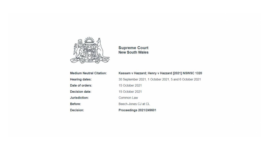With No Bill of Rights, Kassam v Hazzard Was Bound to Fail: An Interview With Professor George Williams

NSW Supreme Court Justice Robert Beech-Jones delivered his ruling on the Kassam versus Hazzard case, which raised close to a dozen grounds contesting the validity of public health order restrictions, as well as vaccine mandates, which have recently been imposed in this state.
All grounds of contention were dismissed. The broad finding was that rather than impinging upon a right to bodily integrity in requiring the COVID-19 vaccine in relation to certain jobs, the measure instead violated the right to freedom of movement if the jab was refused in these circumstances.
Chief Judge at Common Law Beech-Jones explained in his findings that as there is no bill of rights at the federal level – and nor at the state level in NSW – the rights that may have been infringed upon would have to be those “that the common law already recognises”.
So, to simply argue that some pandemic measures rolled out by the NSW government are discriminatory due to their impact solely upon unvaccinated people wasn’t a possibility, as his Honour advised that the common law fails to protect against discrimination.
A lack of protections
The Kassam case was the pointy end of what has become known as the freedom movement, which is opposed to many of the pandemic measures.
Indeed, of late, rights issues have been front and centre in Middle Australia, whereas quite often freedoms and liberties have been taken for granted.
But for those who were focused on rights issues prior to the COVID era, the fact that there is no broad protection for a range of citizen’s freedoms and liberties at the federal level is a well understood issue, which is usually neatly swept under the carpet.
And while recent lockdown measures and vaccine mandates issued without any parliamentary oversight might have shaken many citizens into rights awareness, commentators on the lack of rights protections in this country have been warning of increasingly waning freedoms for some time.
This is especially the case when it comes to the broad range of laws passed in the name of counterterrorism and national security since the New York 9/11 attacks two decades ago. These have eroded the rights of all Australians, often in ways that are not fully understood.
Rights could be protected
UNSW Law Professor George Williams has long argued the need for rights protections to be enacted at the federal level. The constitutional law expert has set out the reasons for this in the co-authored A Charter of Rights for Australia.
The professor has explained that the pursuit of rights-encroaching antiterror laws following 9/11 was in no way confined to our country. In fact, a UN resolution called for it to happen.
However, as Williams underscores, in Australia, the reach and volume of these laws is much broader than in comparable liberal democracies.
Sydney Criminal Lawyers spoke to the eminent Professor George Williams about the constitutional ground raised in Kassam, the difference a bill of rights could have made to the case, and why, until we get such a law at the federal level, it’s near impossible to get any traction in such cases.

A prominent question raised about the recent public health measures has been whether they’re constitutional.
In Kassam versus Hazzard, only one ground directly related to the constitution. This involved the prohibition against civil conscription found in subsection 51(xxiiiA) of the founding document.
Professor Williams, you’re a constitutional law expert. What was this ground all about? And why didn’t it hold?
What this particular clause in the Constitution says is the Commonwealth cannot force doctors to provide services. So, they can’t be conscripted, essentially.
So, if you had a Commonwealth law that said doctors must provide vaccinations, for example, that would be in breach of that conscription guarantee.
The problem for the case is that firstly, it only applies to Commonwealth laws and not state laws. And secondly, there is no compulsion upon doctors to provide vaccinations.
Even if we had a compulsion for people to receive vaccinations, that is still not civil conscription of doctors. So, it’s just not a clause that applies to the circumstances they were complaining of.
Besides the constitutional ground, Kassam involved about ten other contentions raised by two sets of plaintiffs in relation to public health orders and vaccine mandates for certain occupations. Justice Beech-Jones dismissed all grounds.
Overall, what are your thoughts on Kassam? Why wasn’t it successful?
It was not successful firstly, because the NSW Health Act provides a very broad and open-ended power for the government to make public health orders.
In fact, if you look at section 7 of the Act, it says that the section applies “if the minister considers on reasonable grounds that a situation has arisen that is… a risk to public health”.
So, we are certainly in that situation here, and in those circumstances, the minister can take such action and give such orders that the minister considers necessary to deal with the situation.
It’s hard to imagine a broader power than that. And that’s the power that has enabled the wide variety of health orders around lockdowns and the like.
So, it’s very difficult to argue the orders that were made are beyond power in the circumstances. That’s the bedrock problem.
It might have been a more successful argument if there were other restrictions that applied. If Australia had a bill of rights, for example, which guaranteed bodily autonomy or freedom of movement. But we don’t.
So, in essence, the case was challenging a very broadly worded power that was sufficient to make the orders, and not surprisingly the case was unsuccessful.
The Kassam case represents a broader debate around whether lockdown measures and vaccine mandates illegitimately undermined citizens’ rights and liberties.
How have you considered the broad implications of this debate? Would you say the rights issues being raised are warranted?
There are problems with how these orders are made. We’ve had law by decree in NSW, and indeed, at the federal level for some time.
Even though I am supportive of the need to take proportionate and strong action to protect the community, these actions have not been subject to sufficient scrutiny.
The NSW parliament didn’t meet for three months. So, that itself is highly problematic: that you would have such extraordinary powers exercised without the protections needed to ensure that they are proportionate.
Nor did you have the public seeing the debate and scrutiny that would give them confidence that the right actions were being taken.
So, that’s my concern. It’s a matter of process, a matter of scrutiny and accountability.
We have been lacking those things. So, I can understand why that has left people very concerned about whether the decisions are correct, and whether they have been properly justified.
You’ve been warning about the implications of the broad range of powers enacted at the federal level via 90-odd pieces of national security and counterterrorism legislation since the 2001 9/11 attacks.
Why should these laws be of concern for citizens? And does the debate around them overlap with the lockdown debate?
Broadly, what we have seen in response to terrorism, and now in response to the pandemic, is how powerful our governments are and how few checks and balances they have.
They have the ability to make decisions that have an extraordinary impact upon our lives – especially in terms of the counterterrorism cases that see people being gaoled – and yet, we lack even the most basic rights to check and balance them.
We don’t have a general freedom of speech. We don’t have strong rights to bodily autonomy.
There’s a range of pretty basic rights that are missing in our system. And that’s problematic because it really emphases what extraordinary powers our politicians have.
If you look at the federal regime, with the pandemic laws, it even goes to the extent that the federal health minister can make orders that override any other law. And his decisions can’t even be disallowed by parliament.
They are the sorts of powers that you expect to find in a dictatorship, not a country that values its democratic freedoms and ensures they’re respected.
You’re a prominent advocate for the establishment of a federal bill or charter of rights. Australia is the only western democracy without one.
How would legislation that protects specific rights in law have affected the current debate around lockdowns, or even Kassam itself?
It would provide a legal ruler to run over all responses. That legal ruler would recognise that governments can take strong action to protect the community, in fact, it would recognise the community’s right to health.
But there are a number of measures that may well be problematic. So, for example, some of the very severe travel restrictions that prevent Australians even exiting the country, let alone citizens returning home from overseas.
Curfews may be difficult to justify.
So, are a number of the things that have been put in place really reasonable and proportionate responses to the health crisis? In some cases, arguably not.
But there’s nothing that can be done in our legal system to challenge them, and that’s where this sort of instrument would assist.
And lastly, Professor Williams, you’ve been raising the need for a charter of rights for decades now.
Since we last spoke in 2017, the rights debate has picked up in terms of climate, religious freedoms, whistleblower prosecutions, freedom of the press and now there are people on the streets calling for their rights to be upheld in relation to health measures.
Some are considering an appeal of Kassam. But what would you call for in terms of resolving these emerging issues?
It’s hard to see the solutions because we don’t have the legal tools to protect and enforce people’s rights, as the Kassam decision shows.
To deal with the larger problem you need the political solution, hence the call for a bill of rights – a charter of rights – that actually puts something within our legal system that provides respect and protection of these rights.
But until we get that, then people are just going to find themselves disappointed in courts arguing for rights that the legal system doesn’t protect.







